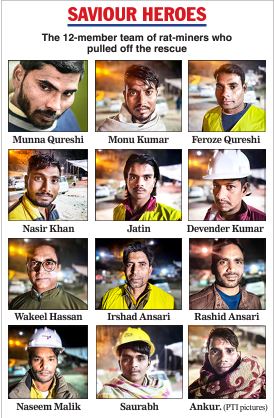
Nov 30, 2023 Many people deserve congratulations for the successful mission of Silkyara Tunnel. The role of the machine was as much as that of humans, as much that of the administration, from the rat miners to the people who came from Australia with their experiences and kept trying. But amidst all this it is important to understand the geography of Uttarakhand and the complexity of the Himalayas. The media coverage of the success of the rescue work of Silkyara Tunnel is showing that even the Himalayas are helpless in front of it. Nobody is worried about him. We have to learn to differentiate between disaster and disaster management. Who will work so hard? There is no hero in sight while talking on these questions. On the contrary, you start seeing him as a villain.
Uttarkashi tragedy: Meet the magical rat-hole miners who pulled off the rescue https://www.telegraphindia.com/india/uttarkashi-tragedy-meet-the-magical-rat-hole-miners-who-pulled-off-the-rescue/cid/1983496 Piyush Srivastava Lucknow Published 30.11.23
The 12 rat-hole miners took turns to work like this inside the pipe from 7.15pm on Monday to 6.30pm on Tuesday to clear the last barrier of 8-10 metres of debris to bring out the workers trapped for 16 days
Work by water researchers, including in the IPCC and the UN’s World Water Development Report 2020, has shown that changes in global water cycles are the bearers of much of climate change’s bad news. As the planet warms – due mostly to the energy sector – we are already witnessing the effects of too much or too little water at the wrong place and time.
Water is life, but unfortunately, the global water community has been slow to provide its own unique response to climate change. They have chosen instead to play second fiddle to fossil fuel mitigation efforts, and to adapt to open-ended consequences when those measures fail to keep global temperature rise below the levels of absolute disaster. This is reflected in global multilateral accords such as the Paris Agreement, which have stressed reducing emissions, a task assigned largely to the energy sector, while the role of the water sector in dealing with both emissions and climate change impacts has occupied a much smaller space.
by Dipak Gyawali
28/11/2023
While embracing technological advancements, it is imperative not to compromise offline systems that have traditionally served as a lifeline for those with limited digital access.
We discuss the obstacles encountered by those using the scheme within its digital framework. We trace changes in two specific aspects of the digital framework: access to information, and changing compliances. The changes in both aspects since 2019 impact not just ‘entitlement holders’ experience of the scheme, but also potentially hamper the seamless flow of benefits. Using case studies gathered in Andhra Pradesh (AP), Gujarat, Odisha, Rajasthan and Telangana, we illustrate the struggles of farmers and local officials in navigating PMKISAN’s digital landscape. This journey underscores the necessity for streamlined and accessible information systems to ensure any welfare programme’s success.
by Chakradhar Buddha and B.D.S. Kishore
30/11/2023
